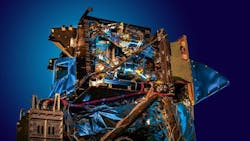Airbus delivers first Sentinel-5 instrument for satellite integration
TOULOUSE, France - Airbus Defense and Space in Toulouse, France announced that the company has delivered the first Sentinel-5 instrument for the European Space Agency (ESA) that will be integrated into MetOp Second Generation Satellite A. The Ultraviolet Visible Near-infrared Short-wave infrared Spectrometer (UVNS) instrument will contribute to the improved monitoring of air quality, changes in the ozone layer, and emissions from wildfires.
The aerospace giant says that Sentinel-5 is one of the so-called “atmospheric sentinels” that are built to answer questions related to the composition of Earth’s atmosphere: its mission is to globally monitor the distribution of atmospheric trace gases and aerosols (particulate matter) on a long-term operational basis in support of the European Union's climate monitoring program Copernicus. The program is a joint initiative of the European Union and ESA. The spacecraft and the instrument will be operated by EUMETSAT, the European Organisation for the Exploitation of Meteorological Satellites.
Sentinel-5 will serve climate, air quality, and ozone/surface UV applications. It will measure from a Low Earth Orbit (LEO) with unprecedented accuracy the atmospheric concentrations of ozone, nitrogen dioxide, sulfur dioxide, formaldehyde, glyoxal, carbon monoxide, methane, and aerosols, covering the entire planet daily. Its data will be exploited by the operational Copernicus Atmosphere Monitoring Service (CAMS) and the Copernicus Climate Change Service (C3S). Data obtained with Sentinel-5 will support operational climate monitoring and the environmental decision-making authorities. The scientific community will have access to new insights into Earth’s atmosphere from the data that the Sentinel-5 instruments provide.
Sentinel-5 is a high-resolution imaging spectrometer system that will analyze the light reflected by Earth’s atmosphere from the ultraviolet to the shortwave infrared range in 7 different spectral bands.
An industrial consortium of about 50 different companies from 13 countries across Europe had been involved in the development of the Sentinel-5 instruments. Its demanding performance required new technology enhancements in different fields such as optics, electronics, structures, etc.
After the delivery of Sentinel-4 about 1.5 years ago, Sentinel-5 is the second atmospheric Sentinel coming from the prime contractor Airbus in Ottobrunn. In the near future, Airbus will deliver three more atmospheric Sentinels (one Sentinel-4 and two Sentinel-5 instruments). They are expected to operate in orbit providing data for the next two decades.
